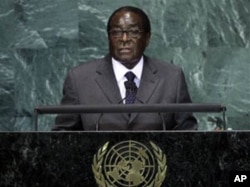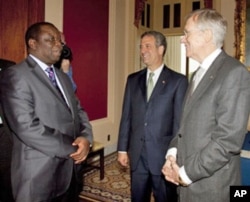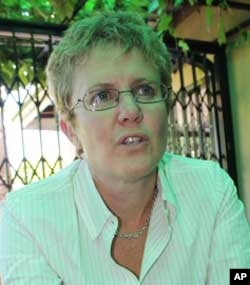An associate editor at the Institute for Security Studies, a South Africa-based think tank, says the spilling of United States government secrets about Zimbabwe by the WikiLeaks organization is “dangerous” for the region, and could lead to instability and violence ahead of the election Harare’s expected to call next year.
“Certainly for southern Africa, the WikiLeaks Zimbabwe revelations are most significant, and I don’t think it’s an exaggeration to say they could destabilize Zimbabwe – and thus the region - even further in the months to come,” says Liesl Louw-Vaudran, the editor of the ISS magazine, the african.org.
“I am not for one second saying WikiLeaks did not have the right to make the information public; I am merely exploring the possible ramifications now that this information is out there,” she clarifies.
WikiLeaks recently began publishing thousands of previously confidential communications between the US State Department in Washington, DC and its embassies around the world. Some of the documents relate to Zimbabwe. The country has been in the throes of political and economic instability for about a decade, as President Robert Mugabe and opposition leader Morgan Tsvangirai have fought a bitter and often violent battle for power.
A so-called “unity government” headed by Mr. Mugabe, of the ruling ZANU-PF party, and Mr. Tsvangirai, of the Movement for Democratic Change (MDC), has failed to end violence, corruption and rampant unemployment there.
Mugabe’s ‘ammunition’
The New York Times has published a secret communiqué leaked to WikiLeaks, from former US ambassador to Zimbabwe, Christopher Dell, to Washington in 2007. It reveals America’s preference for an end to Mr. Mugabe’s rule, in close cooperation with the MDC.
“We need to keep the pressure on to keep Mugabe off his game and on his back foot, relying on his own shortcomings to do him in,” Dell writes.
Louw-Vaudran says, “I do fear that the revelations (are) really going to give ammunition to President Robert Mugabe, especially while we are facing a new election in Zimbabwe next year.”
She adds Mr. Mugabe will “obviously” use the information leaked by WikiLeaks as a “political tool” to further entrench his hold on power. She says it’s now going to be “far easier” for Mugabe to “demonize” Tsvangirai as a “puppet of the Americans.”
“We are sitting with a very tense situation, very delicate, where we’ve got a dictator now for the last 25 years here in Africa, absolutely insistent that any opposition to him is being instigated by the West. And now he has that on paper, and that is dangerous,” says Louw-Vaudran.
She comments that she’s “sure Robert Mugabe is putting his feet up late at night and laughing his head off, not quite believing that such a massive boost has been given to him by his arch enemy, America, ahead of an election. It’s manna from heaven for him!”
Louw-Vaudran says “already the gloating” about “Dell’s criticisms directed at Tsvangirai” and the “vilification and mockery” of the MDC leader has started in Zimbabwe’s state-owned media. The Herald newspaper, for example, writes of the Dell memo as proof that Tsvangirai and the MDC have grown “fat on the back of engorging the West's filthy lucre over the past decade as Uncle Sam's willing cat paws.”
“The WikiLeaks information has served to make the propaganda that Mugabe has been using all along against his opposition, such as that the US is funding the MDC, so much more credible,” states Louw-Vaudran. “It’s lovely for Mugabe to actually sit back and say, ‘Listen, I told you so …’”
US and MDC relationship now ‘strained’
She says “what’s also a godsend” for Mr. Mugabe is the American ambassador’s “strong” criticism of Tsvangirai in the cable leaked to WikiLeaks, and reported by the New York Times.
Dell describes Tsvangirai as a “flawed figure, not readily open to advice, indecisive and with questionable judgment in selecting those around him” and goes on to write that while the MDC leader is “a brave democrat” and “the indispensable element for opposition success,” he is “possibly an albatross around their necks once in power….”
Dell brands the MDC “far from ideal” as opposition to ZANU-PF, and says had Washington “had different partners,” it “could have achieved more” in Zimbabwe.
In her reaction to this, Louw-Vaudran comments, “Well, whether it’s the end of Washington’s previous very close relationship with the MDC, we can’t yet say. But that would certainly be great for Mugabe and ZANU-PF. What we can be certain of is that the relationship between the US and the MDC, in the immediate future, is going to be much more strained, and that must be very pleasing to Mugabe indeed.”
She says for “poor Morgan Tsvangirai,” the spilling of the Dell secret communication to Washington “must be a low blow; it must really hurt, despite his initial reaction to laugh it off as insignificant….”
In his reaction to the WikiLeaks revelations, the MDC leader has said he’s “not bothered” and that they won’t negatively influence his relationship with America. He also claims Dell’s opinions are at odds with those of the majority of Zimbabweans, who voted for Tsvangirai in the 2008 polls – widely believed to have been “stolen” by ZANU-PF.
Also in his secret dispatch to Washington, Dell writes “Robert Mugabe has survived for so long because he is more clever and more ruthless than any other politician in Zimbabwe. To give the devil his due he is a brilliant tactician.”
Such words, says Louw-Vaudran, give “tremendous encouragement and impetus” to Zimbabwe’s president. “He’s very proud of that; he’s actually thrilled to be called a shrewd tactician,” she says.
‘A dangerous secret’
A formerly secret US cable gleaned from WikiLeaks by Britain’s Guardian newspaper reveals that South Africa’s Minister of International Relations, Maite Nkoana–Mashabane, refers to Mr. Mugabe as a “crazy old man.”
Louw-Vaudran says this information is “shocking” in that Nkoana-Mashabane “isn’t exactly known for her forthright opinions on foreign affairs … Many people thought President Jacob Zuma appointed her because she would not take a strong stand on controversial issues such as Zimbabwe, because she has … very little experience [in foreign affairs].”
Nkoana-Mashabane’s statement will “certainly not please Mugabe,” says Louw-Vaudran. “That certainly won’t be very good for South Africa that’s trying to mediate (in Zimbabwe) but apparently with very little success. Mugabe still runs rings around President Jacob Zuma who he considers to be a new boy on the block.”
But she adds that the South African minister’s disparaging comment about the Zimbabwean leader will “encourage people who have been despairing at South Africa’s supposed role as Mugabe’s lapdog.”
Louw-Vaudran maintains, though, that the Nkoana-Mashabane comment is “a dangerous secret to reveal given the type of character that we’re dealing with” in Mr. Mugabe.
“In southern Africa and Zimbabwe, those little gossip statements and judgments of people are not just innocent statements; people could die because of the sensitivities of this one or that one. Really, we can’t take it too lightly,” she insists.
Louw-Vaudran says the “consequences” of the revelation of “what the Americans really think of Tsvangirai, and their apparent ongoing support for the MDC,” are going to be with southern Africa “for quite some time, and could prove to be very bad” for some people.
“Already we see Mugabe’s attitude to the MDC hardening even more, with him no longer attending meetings with Tsvangirai and moaning even more about how he’s being forced to be part of an ‘illegal’ unity government.”
Louw-Vaudran says the WikiLeaks revelations have “opened up a fresh and possibly very negative angle” to Zimbabwean politics, at a time when Zimbabweans are “growing increasingly nervous” about the future.






